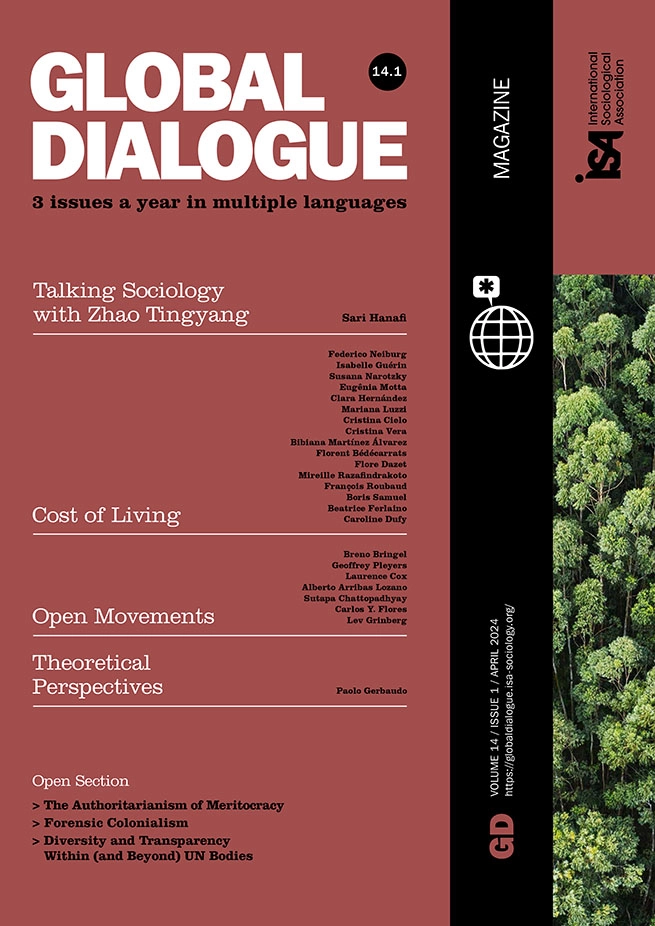A Proposal for a South-South Agenda
February 27, 2014
Our interest is to address the following question: Can sociology constitute itself as a global phenomenon without considering the diversity of social and cultural contexts and without contributing to the formation of activist intellectuals and mediation networks that make the link between the global and the local?
Globalization is not only an economic, financial or technological phenomenon but, perhaps above all, an intellectual process expanded to the whole world. On the one hand the hegemony of the neoliberal intellect has been imposed and on the other, it reveals in its cracks the still subsisting potentiality of the intellect of resistance. Thus, globalization of sociology (or global sociology), is the result of these paradigm changes in the areas of academic and critical life. However, the advance of a global sociology does not eliminate national and regional sociologies that were dominant in the twentieth century. Global sociology in fact needs national and regional sociology to explain the complexity of contemporary societies.
The critical perspectives of the global south may contribute to the changes that these more traditional sociologies have not achieved in their own central context, namely the articulation of the global and the local as well as new forms of articulation between the social and the subjective. In this direction it is important to emphasize the initiative of Latin American intellectuals in creating a south-south dialogue, which first took place at the Faculty of Social Sciences, University of Buenos Aires, Argentina, associated with the Second ISA Forum. After this first meeting there were others that took place in the Federal University of Rio Grande do Sur, Porto Alegre, Brazil; the University of Tijuana, Los Cabos, Mexico; the Paris-Sorbonne University of France. This year we are organizing South-South Forums at National Universities within Argentina (El Calafate and Resistencia).
The strength of this idea is the ability to help identify inside the complex world-system a unique agenda for the societies in South-South exchanges involving transnational networks, facilitating the identification of obstacles and outputs facing national societies in their contexts and global projections.
Thus, the idea we propose is to organize a call for a permanent section (or Dossier) for Latin America and the South-South collaboration, where intellectual activists from Latin America, the Caribbean, Africa and Asia and all those identifying with the south-south critical intellect are invited to propose ideas to advance the south-south agenda. We wish to provide a forum to discuss the potential of this idea as a challenge in the debate about and the epistemic turn to global sociology. This initiative of a permanent section is being carried forward with great success by Sociological Horizons, Journal of the Argentinean Association of Sociology.
From the first meeting we can mention some relevant issues that may be fruitful in the initial discussions so that in the Third ISA Forum to be held in Vienna in 2016 the proposals and scientific developments are presented for discussion. Some of the themes that have emerged from these early meetings may constitute axes for discussion:
• The multiple possibilities to define the South, as the South in the North and the importance of taking into account related concepts such as: colonialism, subalternity, underdevelopment, periphery as well as heterogeneities and asymmetries in the Global South;
• The role of universities and scientific agencies, their social function and the critique of the commodification of knowledge and education;
• The systematic analysis of the current structural crisis of capitalism in the center and the periphery and its impact on the Global South;
• The transfer and exchange of knowledge for social transformation processes;
• Strategic use of social networks and the creation / strengthening of collaborative networks;
• The delimitation of certain premises to weave a critical dialogue between different sociological and intellectual traditions to ensure plurality and intellectual autonomy;
• The recovery and updating of the critical legacy of social and political reflection produced to interpret and transform reality.
Alberto L. Bialakowsky, former President of Latin American Sociological Association (ALAS)
Paulo H. Martins, former President of ALAS
Alicia Itatí Palermo, President, Argentinean Association of Sociology
for Global Express, February 27, 2014
